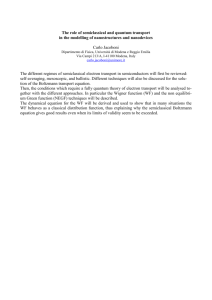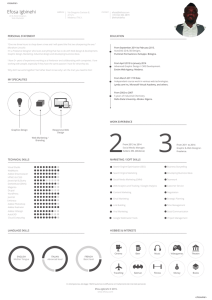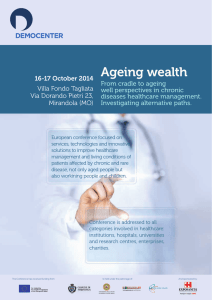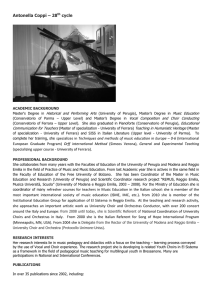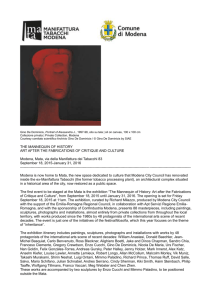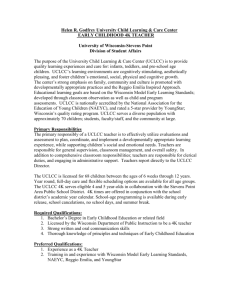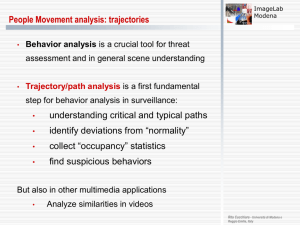Workshop “Dialogue on Evaluation and Innovation in Local
advertisement
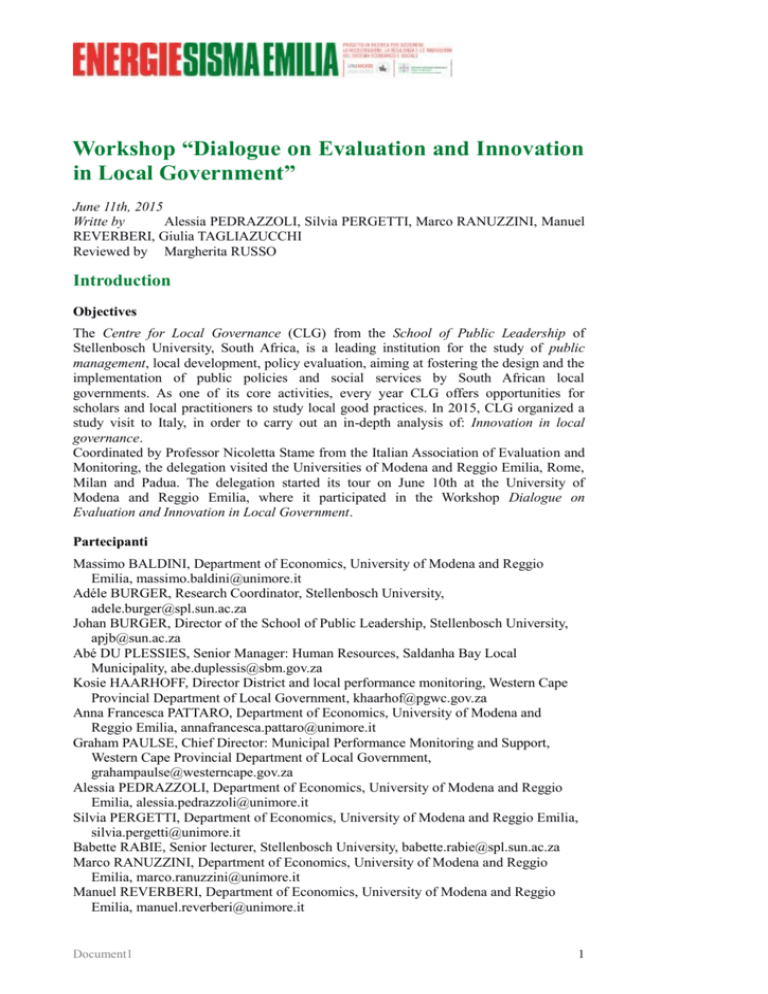
Workshop “Dialogue on Evaluation and Innovation in Local Government” June 11th, 2015 Writte by Alessia PEDRAZZOLI, Silvia PERGETTI, Marco RANUZZINI, Manuel REVERBERI, Giulia TAGLIAZUCCHI Reviewed by Margherita RUSSO Introduction Objectives The Centre for Local Governance (CLG) from the School of Public Leadership of Stellenbosch University, South Africa, is a leading institution for the study of public management, local development, policy evaluation, aiming at fostering the design and the implementation of public policies and social services by South African local governments. As one of its core activities, every year CLG offers opportunities for scholars and local practitioners to study local good practices. In 2015, CLG organized a study visit to Italy, in order to carry out an in-depth analysis of: Innovation in local governance. Coordinated by Professor Nicoletta Stame from the Italian Association of Evaluation and Monitoring, the delegation visited the Universities of Modena and Reggio Emilia, Rome, Milan and Padua. The delegation started its tour on June 10th at the University of Modena and Reggio Emilia, where it participated in the Workshop Dialogue on Evaluation and Innovation in Local Government. Partecipanti Massimo BALDINI, Department of Economics, University of Modena and Reggio Emilia, massimo.baldini@unimore.it Adéle BURGER, Research Coordinator, Stellenbosch University, adele.burger@spl.sun.ac.za Johan BURGER, Director of the School of Public Leadership, Stellenbosch University, apjb@sun.ac.za Abé DU PLESSIES, Senior Manager: Human Resources, Saldanha Bay Local Municipality, abe.duplessis@sbm.gov.za Kosie HAARHOFF, Director District and local performance monitoring, Western Cape Provincial Department of Local Government, khaarhof@pgwc.gov.za Anna Francesca PATTARO, Department of Economics, University of Modena and Reggio Emilia, annafrancesca.pattaro@unimore.it Graham PAULSE, Chief Director: Municipal Performance Monitoring and Support, Western Cape Provincial Department of Local Government, grahampaulse@westerncape.gov.za Alessia PEDRAZZOLI, Department of Economics, University of Modena and Reggio Emilia, alessia.pedrazzoli@unimore.it Silvia PERGETTI, Department of Economics, University of Modena and Reggio Emilia, silvia.pergetti@unimore.it Babette RABIE, Senior lecturer, Stellenbosch University, babette.rabie@spl.sun.ac.za Marco RANUZZINI, Department of Economics, University of Modena and Reggio Emilia, marco.ranuzzini@unimore.it Manuel REVERBERI, Department of Economics, University of Modena and Reggio Emilia, manuel.reverberi@unimore.it Document1 1 Tommaso ROTELLA, Municipality of Modena, Member of Executive Council, tommaso.rotella@comune.modena.it Margherita RUSSO, Department of Economics, University of Modena and Reggio Emilia, margherita.russo@unimore.it Louis SCHEEPERS, Municipal Manager of Saldanha Bay Local Municipality, louis.scheepers@sbm.gov.za Paolo SILVESTRI, Department of Economics, University of Modena and Reggio Emilia, paolo.silvestri@unimore.it Giulia TAGLIAZUCCHI, Department of Economics, University of Modena and Reggio Emilia, giulia.tagliazucchi@unimore.it Workshop: proceedings and results Introduction The workshop starts with a presentation by Russo of the Department of Economics Marco Biagi. A second presentation of histories, objectives, research topics, approach and core values of Stellenbosch University and Centre for Local Governance (CLG) by Director Burger follows. University of Stellenbosh has a truly multidisciplinary approach, with multiple research topics, and an extensive international network. It highly valorises and fosters exchanges between academics and local government practitioners. First session: The main features of local governments in Italy and South Africa Pattaro opens the first sessions with a presentation on fundamentals of Italian government system. Russo reflects on the lack of long-term territorial planning in recent years, while Silvestri illustrates financing strategies of local governments, mainly based on national taxes. Rabie introduces fundamentals of South African government system. Such a system developed during the democratisation process in the 90ies, and features a progressive merging of smaller local governments into bigger, more efficient unities. Local governments in South Africa benefits from availability at local scale of greater financial resources (with notable exceptions) and bigger decisional powers. Weaknesses are presented as follows: coordination problems with central government, corruption, bureaucracy, local differences, and lack of skills of government personnel. Local practitioners from Saldanha Bay Local Municipality, Du Plessies and Scheepers, illustrates the areas of intervention of Saldanha Bay local government, organizational structure, and current challenges. Quality of data and information is impressive, and is due to support from and cooperation with university and research institutions. Second session: Presentation of Municipality of Modena The visiting delegation is welcomed by Municipality of Modena by Member of Executive Council Tommaso Rotella. After a guided tour of the building, Rotella illustrates few projects and innovations introduced by Municipality of Modena. In particular, he focuses on the initiatives aiming at revitalizing the local economy (co-working spaces, support to start-ups). Rabie shows interest in the differences between public administrators in South Africa and in Italy, and in participation of stakeholders in government decision-making. Third session: Socio-economic conditions of families in the province of Modena and in Stellenbosch/ Cape Winelands Silvestri opens the third session with an introduction on Centre for Analysis of Public Policies (CAPP) and methodology and objectives of ICESmo survey, meant at analysing Document1 2 the socio-economic conditions of Modena families. Baldini gives an overview of the findings of ICESmo3, and focuses on poverty. Rabie asks clarifications on the use of data in order to support the design of local policies. Burger follows and presents socio-economic conditions of Western Cape province. Striking differences with the Italian situation emerge; few aspects need to be underlined:: a very young population and a very small percentage of people older than 65 years, internal and external immigration flows, high unemployment rates, diffusion of HIV and TB viruses, as well as high obesity rate, gangsterism and crime. Fourth session: Emergent issues in local development Russo presents the project Energie Sisma Emilia, and shows a cluster analysis of the earthquake area. She highlights the small dimensions of governments in charge of the reconstruction process, and resulting challenges in terms of long-term perspectives and use of resources. Few innovations in local governments following the earthquake are introduced, i.e. a digital infrastructure for filing construction applications. A debate on prevention and review of public policies for natural disaster management follows. Scheepers concludes with a presentation of a local development project in Saldhana Bay, aiming at renovating an unconstructed urban area. The project focuses on a merging of different urban functions in the same area: economic, housing, administrative and commercial. Silvestri and Russo recall a similar project carried out in Modena in the 50ies. Document1 3
